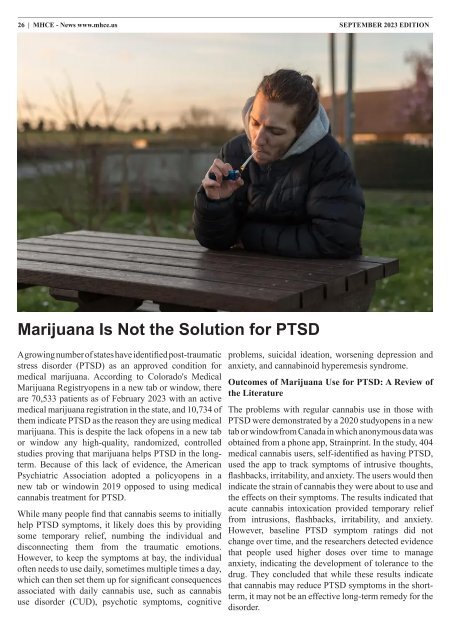Create successful ePaper yourself
Turn your PDF publications into a flip-book with our unique Google optimized e-Paper software.
26 | <strong>MHCE</strong> - News www.mhce.us SEPTEMBER <strong>2023</strong> EDITION<br />
Marijuana Is Not the Solution for PTSD<br />
A growing number of states have identified post-traumatic<br />
stress disorder (PTSD) as an approved condition for<br />
medical marijuana. According to Colorado's Medical<br />
Marijuana Registryopens in a new tab or window, there<br />
are 70,533 patients as of February <strong>2023</strong> with an active<br />
medical marijuana registration in the state, and 10,734 of<br />
them indicate PTSD as the reason they are using medical<br />
marijuana. This is despite the lack ofopens in a new tab<br />
or window any high-quality, randomized, controlled<br />
studies proving that marijuana helps PTSD in the longterm.<br />
Because of this lack of evidence, the American<br />
Psychiatric Association adopted a policyopens in a<br />
new tab or windowin 2019 opposed to using medical<br />
cannabis treatment for PTSD.<br />
While many people find that cannabis seems to initially<br />
help PTSD symptoms, it likely does this by providing<br />
some temporary relief, numbing the individual and<br />
disconnecting them from the traumatic emotions.<br />
However, to keep the symptoms at bay, the individual<br />
often needs to use daily, sometimes multiple times a day,<br />
which can then set them up for significant consequences<br />
associated with daily cannabis use, such as cannabis<br />
use disorder (CUD), psychotic symptoms, cognitive<br />
problems, suicidal ideation, worsening depression and<br />
anxiety, and cannabinoid hyperemesis syndrome.<br />
Outcomes of Marijuana Use for PTSD: A Review of<br />
the Literature<br />
The problems with regular cannabis use in those with<br />
PTSD were demonstrated by a 2020 studyopens in a new<br />
tab or windowfrom Canada in which anonymous data was<br />
obtained from a phone app, Strainprint. In the study, 404<br />
medical cannabis users, self-identified as having PTSD,<br />
used the app to track symptoms of intrusive thoughts,<br />
flashbacks, irritability, and anxiety. The users would then<br />
indicate the strain of cannabis they were about to use and<br />
the effects on their symptoms. The results indicated that<br />
acute cannabis intoxication provided temporary relief<br />
from intrusions, flashbacks, irritability, and anxiety.<br />
However, baseline PTSD symptom ratings did not<br />
change over time, and the researchers detected evidence<br />
that people used higher doses over time to manage<br />
anxiety, indicating the development of tolerance to the<br />
drug. They concluded that while these results indicate<br />
that cannabis may reduce PTSD symptoms in the shortterm,<br />
it may not be an effective long-term remedy for the<br />
disorder.


















